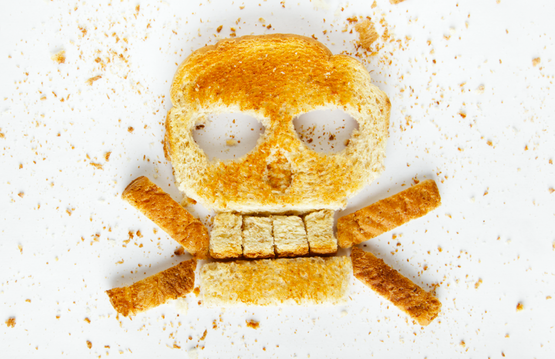|
By: Jessica Mattern Both the gluten-free and ketogenic diets have become increasingly popular recently, and with good reason—particularly for those suffering from autoimmune conditions like celiac disease or those otherwise suffering from an allergy to gluten.
Believe it or not, 1 in 133—or 1% of the population, and mostly women—in the US have celiac disease, a condition that can result in some adverse health issues that can significantly impair the quality of life. Despite the condition's potential to drastically limit one’s well-being, there are some simple dietary changes you can make to tip the proverbial scale in your favor and prevent the disorder's symptoms. What Is Celiac Disease? Abstaining from gluten extends far beyond getting into the current dietary craze for anyone with celiac disease. Those with the disorder cannot process the protein gluten, and consuming it, even in small amounts, can prove problematic for many reasons. Celiac disease is a severe, genetic, autoimmune disorder that is brought on by consuming dietary items like wheat, oats, and grains such as rye and barley, due to their gluten content. Also referred to as celiac sprue, nontropical sprue, and gluten-sensitive enteropathy, celiac disease is known to damage the villi in the small intestine, which leads to malabsorption of nutrients and eventually malnutrition, despite one eating an otherwise healthy diet. Furthermore, celiac disease can lead to an increased risk of developing thyroid disease, infertility, the triggering of other autoimmune disorders, osteoporosis, and even some cancers! Sadly, 83% of the 3 million Americans currently living with celiac disease are undiagnosed or misdiagnosed. Although celiac is a genetic disorder and passed on from parent to child, traumatic events like surgery, pregnancy, or severe emotional distress can trigger the onset of the disease. Getting a diagnosis for this disease can be a tricky deal because its symptoms overlap with some other conditions, so it can be challenging to isolate as the issue. Luckily, your doctor can administer a basic antibody blood test, which some will use in addition to a genetic test and a small intestinal biopsy to determine a diagnosis. If you've already been diagnosed or have a hankering feeling that the health issues you're experiencing are a result of celiac disease, there's good news! There are some simple dietary changes you can make today—in addition to the medical protocol established with your doctor—to ease the disorder's symptoms. Mainly, it comes down to two things: stop eating gluten entirely and significantly reduce the consumption of sugar in your diet! Don't be intimidated. Look, we know gluten is ubiquitous and added to some of your favorite comfort foods—we see the struggle, gluten is everywhere—but we will share a few adjustments below to help you start living a gluten-free, ketogenic lifestyle without missing a thing! Why Should I Go Gluten-Free? We've already established that those with celiac disease must avoid gluten with vigilance to prevent adverse effects, and this is why; the following are some commonly-experienced symptoms of celiac disease:
Symptoms Of Celiac Disease Although a bit of a chameleon since it shares traits with some other disorders, those with the disease, also known as coeliac disease, generally note experiencing the ten following symptoms: Celiac Symptom #1: Diarrhea Despite often being misdiagnosed as irritable bowel syndrome (IBS), abdominal pain, bloating, abdominal distention, and diarrhea are all hallmark symptoms of celiac disease. It is advised to get tested for celiac disease, If experiencing symptoms that appear to be IBS, to rule it out as a source of causation. Celiac Symptom #2: Mouth Ulcers Many people may envision abdominal issues when they think of celiac disease, but the condition can also damage soft body tissue, including oral tissue, causing mouth ulcers and sores. Celiac-related sores present very similar to canker sores and are thought to develop due to the nutritional deficiencies brought on by the disease prohibiting proper nutrient absorption. Fortunately, the sores and ulcers can be prevented by avoiding all gluten-based products, as the lesions are known to subside once the body is free of the inflammatory protein. Celiac Symptom #3: Anemia The intestinal damage that occurs during the onset of celiac disease results in the body's inability to absorb iron, folate, and vitamin B12, which leads to anemia as well as a B12 deficiency. In addition to dietary changes, it may be helpful to supplement with iron, folate, and B12 to avoid unwanted nutritional shortfalls. Celiac Symptom #4: Osteopenia and Osteoporosis The ability of the small intestine to absorb nutrients such as calcium is essential for building and maintaining healthy bones. Unfortunately, the intestinal damage associated with celiac disease compromises bone health due to the malabsorption of calcium, making the bones more susceptible to fractures and breakage. Celiac Symptom #5: Neurological Symptoms Although more known for its adverse impact on the digestive system, celiac disease can also affect the neurological system. The most common neurological effect experienced by those with celiac disease is called small fiber neuropathy and often presents itself with tingling, numbness, a burning sensation, electric-shock sensations in the limbs, or stinging in the torso or face. This condition may also lead to dizziness and fainting upon standing up, abnormal sweating, sexual dysfunction, bladder symptoms, skin changes, and hair loss. Celiac Symptom #6: Infertility Celiac disease can lead to infertility in both men and women, likely caused by the disease inhibiting proper nutritive absorption from foods eaten by sufferers. Infertility issues in women are more tied to ovulation while it impacts the adequate production of healthy sperm in men. Fortunately, a gluten-free diet, specifically a ketogenic version, is an excellent way to boost reproductive hormones and mitigate the effects of celiac disease! Celiac Symptom #7: Menstrual Issues In addition to the digestive and neurological issues caused by celiac disease, amenorrhea or missed menstruations are another issue found in about 20% of women with the autoimmune disease, as compared to the instances seen in observations of healthy women, with their rates as low as 2%. There's no definitive explanation as to why women with celiac disease experience issues with menstruation, but preliminary theories point to chronic inflammation. The excellent news is that a strict gluten-free diet, combined with almost any version of a ketogenic diet, is ideal for balancing your hormones and mitigating all adverse symptoms of celiac disease. Also, adding in an exogenous ketone supplement, can help you enjoy the hormonal balance, accelerated fat loss, and mental acuity often attributed to achieving a state of metabolic ketosis, with enough dietary wiggle room to live a gluten-free, keto lifestyle for the long haul. Celiac Disease Symptom #8: Abnormal Bleeding Unfortunately, one of the side effects of celiac disease is malabsorption of vitamin K. This is a vital point to note because a vitamin K deficiency can lead to clotting disorders, and has also been associated with lower levels of iron, hemoglobin, cholesterol, and protein levels in those with the disease. Celiac Disease Symptom #9: Weight Loss Many are excited to see fewer pounds reflected when they step on the scale, but unintended weight loss can be indicative of a more significant issue, as is the case for those with celiac disease. Weight loss or inability to gain weight may be indicative of physiological disorders. It can even result in a child's failure to thrive due to malabsorption, which is particularly the case for children with celiac disease. Keeping a keen eye on nutrition, while eliminating gluten from your diet entirely, will go a long way in helping to support proper digestive function, and overall growth and development. Celiac Disease Symptom #10: Steatorrhea This is a touchy one, and there's no pleasant way to describe it: steatorrhea is a condition that leads to pale, oily, and particularly foul-smelling stool. Those who suffer from the condition may experience booty leakage or fecal incontinence, as well. Listen, we tried to warn you, but we'd be remiss if we didn't tell you—so now you know, you're welcome. Can I Do Gluten-Free On A Keto Diet? Not only can you do a gluten-free, ketogenic diet—we highly suggest it! Complete removal of gluten from the diet is known to alleviate symptoms of celiac disease, and the ketogenic diet does wonders to regulate digestive, hormonal, and metabolic health, all support needed in particular for those who have celiac disease. Pros of a Gluten-Free Keto Diet Eliminating gluten from your diet while following a ketogenic diet can help stave off adverse effects of celiac disease while also offering the therapeutic and fat-loss benefits of nutritional ketosis, pretty sweet! Also, ketosis will directly help combat fatigue, many with celiac experience, while acting to regulate glucose levels and providing the body with an optimal food source once fat-adapted. Restriction of carbs ushers the body to convert from running on glucose to running on fat for fuel. Ideal Foods On A Gluten-Free Keto Diet Steering clear of any food that contains gluten, including grains and legumes along with sugar, is the name of the game when following a gluten-free, ketogenic diet. The overall goal is to remove gluten from the diet entirely—even small amounts can cause adverse effects—and to keep daily carbohydrate macronutrients low enough to maintain extended states of metabolic ketosis. Again, those predisposed to or living with celiac disease can significantly improve their quality of life with a guided, nutritional protocol. The following are some ideal foods to work into your meal plan if following a gluten-free, ketogenic diet:
Cons of a Gluten-Free Keto Diet A gluten-free protocol is quite rigid in that it is an all-or-nothing proposition, especially for those suffering from an immune disorder like celiac disease. A little gluten here and there will not go unnoticed by your body, so cheating is a no-no. Fortunately, there are so many delicious and gluten-free food options to explore. You’ll never get bored on a gluten-free, ketogenic diet. Being prepared is vital when on this variation of a ketogenic diet because you never want to get caught out and about at work or running errands, hungry, and without a healthy food option on-hand. Plan to carry protocol-friendly foods with you during the day and leverage meal prep on the weekends to get organized and ensure that you have healthy meals at the ready, for stress-free mealtimes. Summary Celiac disease affects people on a spectrum, with mild symptoms for some and debilitating effects for others. Fortunately, the removal of gluten from the diet of celiac sufferers has long proven a powerful tool to reduce or eliminate the symptoms of this genetic disorder. Furthermore, the addition of the ketogenic approach to a gluten-free dietary protocol is ideal when working to manage the symptoms of celiac disease as it inherently helps to regulate all hormonal, metabolic, neurological, and physiological systems in the body. Plan and ease into the protocol while enjoying some of the most delicious foods you've ever tasted; many admit feeling a little guilty on the ‘diet,’ although they're eating entirely on according to plan! Before you know it, you'll be feeling more vibrant and may even be down a few dress sizes as a bonus! You’re on your way to wellness and can unapologetically enjoy every bite along with your journey.
0 Comments
Leave a Reply. |
About Dr. HillDr. Lester (Ted) Hill is a licensed Osteopathic physician, an advanced clinical Nutrition Response Testing® practitioner, and the founder of East Liverpool Family Practice. Blog Archives
February 2024
|
Our HoursMonday: 12pm - 8pm
Tuesday: 9am - 5pm Wednesday: Closed Thursday: 9am - 5pm Friday: 9am - 5pm Saturday & Sunday: Closed Our Location16844 Saint Clair Ave. Suite 3
East Liverpool, Ohio 43920 |
Contact us |
© 2017 East Liverpool Family Practice



 RSS Feed
RSS Feed